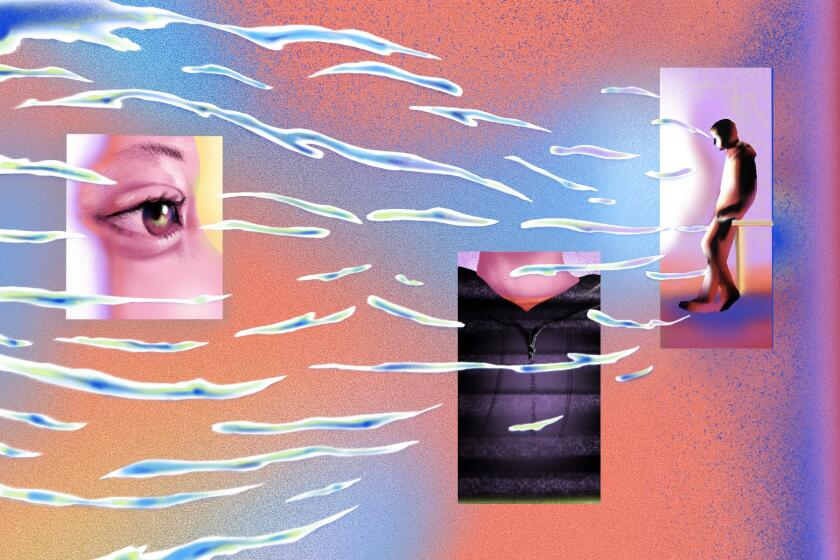‘Trauma’ by Patrick McGrath
Trauma
A Novel
Patrick McGrath
Alfred A. Knopf: 210 pp., $24.95
Maybe psychiatrists are more interesting than the rest of us -- or maybe they only seem interesting because they’re so interested in the rest of us. Does their intimate engagement with our problems, their learned empathy, cause them to absorb some of the vapors of our suffering into their own lives? That’s one of the notions Patrick McGrath flirts with in his seventh novel, “Trauma,” a psychological thriller whose protagonist is a therapist who specializes in treating victims of trauma.
Charlie Weir grew up in a dysfunctional New York family, with an unstable and detached mother, an ineffectual (and ultimately disappearing) father and an older brother who seems to have emerged from this background nearly unscathed. We hear Charlie’s story in the first person: “I am, as will be apparent by now, a psychiatrist. I do professionally that which you do naturally for those you care for, those whose welfare has been entrusted to you.” It’s Charlie’s view that most psychiatrists are driven into the field by difficult mothers -- a notion he comes clean about and makes peace with early in the book.
Charlie isn’t a particularly well-adjusted guy, and his life’s work only magnifies his own problems. His marriage falls apart when his wife’s brother, Danny, a Vietnam vet Charlie had been treating when the couple met, commits suicide. Agnes, Charlie’s wife, holds him responsible for her brother’s death. She remarries, taking the couple’s daughter, Cassie, with her -- although she still has enough sympathy and love for Charlie to be drawn back to him. Charlie also becomes involved with a beautiful but deeply disturbed woman named Nora, who, instead of creating an emotional haven for him, only intensifies his isolation. These two women and the man Charlie couldn’t save are just a few of the strands of the mystery Charlie needs to unravel. His own sanity is at stake.
A good writer can find a whole career’s worth of material in madness and complicated family relationships, and McGrath -- whose previous novels include “Spider” and “Asylum” -- hasn’t yet come close to draining that particular well. He was born in England and grew up near Broadmoor Hospital, where his father was a medical superintendent; later he himself worked as an orderly in another mental hospital. He’s unafraid to examine at close range the things that make many of us flinch. In “Trauma,” he finds ways to give shape and texture to grief and pain so that they’re real to us rather than abstractions. After Cassie loses her stepfather, Leon (someone she feels she hasn’t been particularly nice to), she lays out the gifts he gave her when he was alive -- “small treasures” including a silver dollar that his father had given him, a ring with a green stone, an autographed photo of Donny Osmond. McGrath recognizes the importance of these talismans, particularly to a child who’s in need of something to cling to.
“Trauma” is full of sensitive, well-observed touches like that. McGrath’s prose is sturdy and straightforward; it’s also elegant when it needs to be. But as well-written as it is, “Trauma” lacks something crucial: momentum. Page by page, it’s clear that McGrath is building up to something -- some explosive revelation, some cataclysmic event -- that will pull everything together. But here and there the book drifts too far from its focus, and the conclusion doesn’t have the dramatic impact it should. There are sections in the middle of “Trauma” that are more traumatic to get through than the ending is.
But McGrath does pull off one difficult feat: He makes us feel a great deal of sympathy for Charlie Weir, a character who is in some ways too clinical about other people’s feelings and in others too intricately bound with them. Charlie is the kind of fellow who repeatedly messes up relationships (or, perhaps more accurately, succeeds in messing up one significant relationship twice), and his emotional ineptitude can be maddening. But that seems to be part of McGrath’s plan: The more we get to know Charlie, the more empathy we feel for him, particularly because he so often manages to say the wrong thing even though, given his line of work, he should be adept at saying the right one.
McGrath is attuned to the connection -- and the disconnect -- between psychological unrest and the yearning for a place we can call home. Charlie muses on the meaning of that word: “This is what we mean by home, the place where we repeat the past: Freud tells us this, and he also tells us that most of what we call love is our resistance to the prospect of leaving home.”
In his earlier novels, McGrath showed that he knows how to transform the tricks our brains play on us into the stuff of gothic horror. In “Trauma,” he makes us see that our own minds are the most haunted of houses. *
Stephanie Zacharek is a senior writer for Salon.com.
More to Read
Sign up for our L.A. Times Plants newsletter
At the start of each month, get a roundup of upcoming plant-related activities and events in Southern California, along with links to tips and articles you may have missed.
You may occasionally receive promotional content from the Los Angeles Times.






